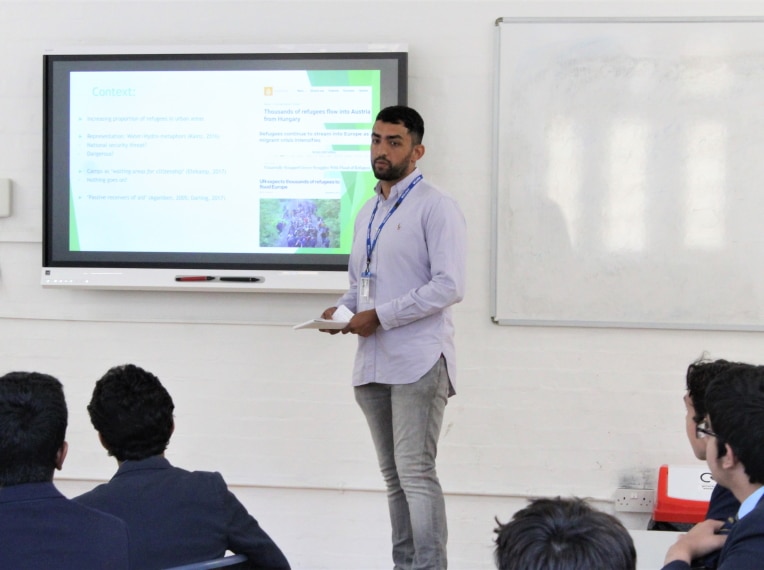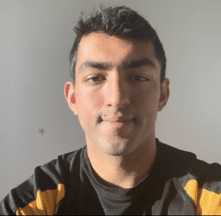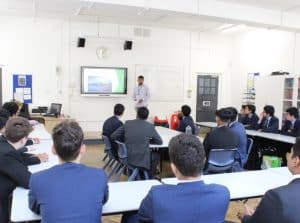Shifting perceptions of refugees: learning from an old boy’s first-hand account of life in a camp

Old Elizabethan Sajjad Dar spoke to QE geographers about the powerful lessons he learned while volunteering at Eleonas refugee camp in Greece.
 Sajjad (OE 2009–2016), who graduated in Human Geography from Durham University, highlighted how media portrayals often create negative perceptions of refugees, often showing them either as a threat or as merely passive receivers of aid.
Sajjad (OE 2009–2016), who graduated in Human Geography from Durham University, highlighted how media portrayals often create negative perceptions of refugees, often showing them either as a threat or as merely passive receivers of aid.
He set out in his talk to make a case for an alternative view, highlighting the fact that, for example, refugees were generally better at organising workshops than the volunteer helpers working in the camp.
Emily Parry, Head of Geography, said: “I am very grateful to Sajjad for giving an inspiring and engaging talk that so powerfully illustrated why Human Geography is a fascinating and important area of study.”
After completing his MA in Human Geography at Durham, Sajjad took an MSc in Spatial Planning at UCL, which he finished last year. He is currently working as a planning officer for the London Borough of Newham.
His talk, which was entitled The Power of Representation, centred on his dissertation, which compared media representations of refugees with his own experience of volunteering at the refugee camp and was entitled Navigating everyday life at camp Eleonas.
The camp in Athens hosts refugees from Syria, Senegal and Somalia. Sajjad’s work in a small school there focused on helping young refugees with Key Stage 1-level studies and on teaching English speaking, literacy and comprehension at a higher level.
Corresponding to the dissertation’s title, in his talk he considered how refugees live their lives in the camp and “what we can learn about their life from this”.
 His aim, he said, was to “unveil narratives that are often not shown by the general media”. How refugees are represented is very important, he averred. Sajjad noted that ‘flooding’ metaphors are often used in reference to refugees, implying that they present a problem which is “overwhelming and uncontrollable”.
His aim, he said, was to “unveil narratives that are often not shown by the general media”. How refugees are represented is very important, he averred. Sajjad noted that ‘flooding’ metaphors are often used in reference to refugees, implying that they present a problem which is “overwhelming and uncontrollable”.
He added: “Whoever has the power to define an object has a lot of power over that object, with the object in this case being refugees.”
Sajjad also talked about his degree studies and the career he has recently started. He reflected, in particular, on the field trip he took to Jerusalem in the fourth year of his MA and discussed the differing senses of place in the various religious quarters of the city.
While at Durham, he was also his college’s representative for the COCO charity, which works globally with the aim of providing “sustainable sources of quality education to children living in poor and marginalised communities”.
The lunchtime talk was open to boys studying Geography in Years 10 and 12.
